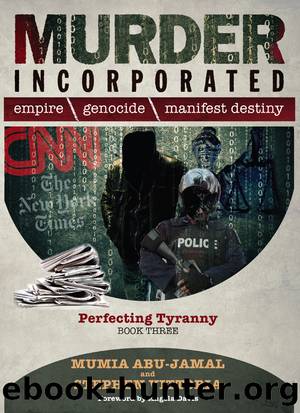Murder Incorporated - Perfecting Tyranny by Abu-Jamal Mumia;Davis Angela;Vittoria Stephen;

Author:Abu-Jamal, Mumia;Davis, Angela;Vittoria, Stephen;
Language: eng
Format: epub
Publisher: Prison Radio
(Listen to it today and hear the joyful laughter. It's fucking hilarious!)
Two months later, Carlin is arrested on obscenity charges at Milwaukee's Summerfest. In fact this arrest was one of numerous Carlin endured for performing his legendary âSeven Dirty Words.â
About a year or so later, in 1973, âShit, piss, fuck, cunt, cocksucker, motherfucker, and titsâ floated through speakers inside John Douglassâ car while the CBS executive and his teenage son are cruising along. Pacifica Network's New York City station, WBAI, was broadcasting Carlin's âSeven Dirty Wordsâ routine from his new album, Occupation: Foole. It turns out that Douglass was also a member of a group called âMorality in Media,â a haughty assemblage that sees themselves as a Cerberus guarding what is right and holy in the American zeitgeist. A month later Douglass filed a complaint with the Federal Communications Commission (the good old FCC).
Pacifica passionately defended the broadcast, comparing the importance of Carlin's work to that of Mark Twain's. Without fining Pacifica, the FCC issued a warning but the network didn't stop thereâa Circuit Court in Washington, D.C. (by a 2-1 vote) declared that the commission did not have the legal authority to regulate the WBAI broadcastâone justice citing constitutional protection, the other citing the Communications Act's prohibition against censorship.
In 1978, the case reaches the proverbial âhighest court in the landâ where five justices added a nice tight broadcast schedule to the language of the First Amendment. By a 5-4 vote, the Court upheld the FCC's decision, finding that Carlin's act was indecent but not obscene (majority votes: Rehnquist, Stevens, Burger, Blackmun, Powell; minority votes: Marshall, White, Brennan, Stewart) and that the FCC had the authority to protect listeners against what they defined as an invasion of privacy. The Court writing: â[Broadcasters] cannot completely protect the listener or viewer from unexpected program content,â because people are âconstantly tuning in and out.â2
Now here's the beauty part: the majority based their decision on this factâbecause the Carlin broadcast was during the day (2pm), it didn't have as much constitutional protection as if the broadcast happened at midnight. What? Did they even look at the First Amendment? The language seems pretty clear:
Congress shall make no lawâ¦abridging the freedom of speech
Justice William Brennan wrote one of the two dissenting opinions. He begins by writing:
For the second time in two years, see Young v. American Mini Theatres, Inc., 427 U.S. 50 (1976), the Court refuses to embrace the notion, completely antithetical to basic First Amendment values, that the degree of protection the First Amendment affords protected speech varies with the social value ascribed to that speech by five Members of this Court.3
With regard to the invasion of privacy issue, Brennan writes:
Without question, the privacy interests of an individual in his home are substantial and deserving of significant protection. In finding these interests sufficient to justify the content regulation of protected speech, however, the Court commits two errors. First, it misconceives the nature of the privacy interests involved where an individual voluntarily chooses to admit radio communications into his home.
Download
This site does not store any files on its server. We only index and link to content provided by other sites. Please contact the content providers to delete copyright contents if any and email us, we'll remove relevant links or contents immediately.
| Africa | Americas |
| Arctic & Antarctica | Asia |
| Australia & Oceania | Europe |
| Middle East | Russia |
| United States | World |
| Ancient Civilizations | Military |
| Historical Study & Educational Resources |
Never by Ken Follett(2873)
The Man Who Died Twice by Richard Osman(2291)
Machine Learning at Scale with H2O by Gregory Keys | David Whiting(2269)
Fairy Tale by Stephen King(2059)
Will by Will Smith(2033)
Rationality by Steven Pinker(1761)
The Dawn of Everything: A New History of Humanity by David Graeber & David Wengrow(1565)
The Dark Hours by Michael Connelly(1563)
Principles for Dealing With the Changing World Order: Why Nations Succeed and Fail by Ray Dalio(1368)
Friends, Lovers, and the Big Terrible Thing by Matthew Perry(1324)
A Short History of War by Jeremy Black(1295)
HBR's 10 Must Reads 2022 by Harvard Business Review(1251)
Go Tell the Bees That I Am Gone by Diana Gabaldon(1231)
Can't Hurt Me: Master Your Mind and Defy the Odds - Clean Edition by David Goggins(1223)
515945210 by Unknown(1205)
Fear No Evil by James Patterson(1106)
443319537 by Unknown(1069)
Works by Richard Wright(1017)
Going There by Katie Couric(989)
